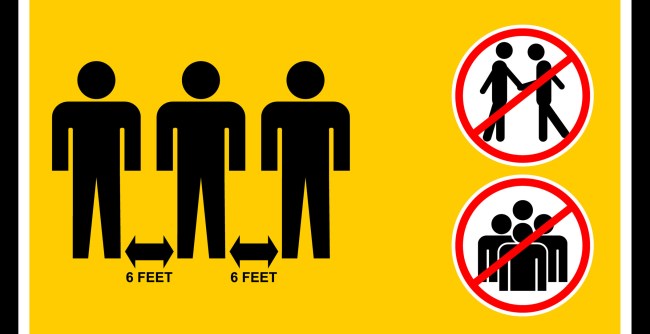
iStockphoto
Have you become numb to all of the predictions related to the ongoing health crisis? When will it be over, how many people will it affect, how much the economy is going to suffer, and the like? I hear you.
Everything being said these days about it seems to come with more than a few grains of salt.
Which means that in order to protect ourselves we have to always err on the side of caution and “overdo” any precautions that have been recommended or are already in place. It’s just the wise thing to do.
Of course, the two biggest precautions that have been repeated over and over again are (1) wash your hands and (2) practice social distancing.
The question therefore is, “How damn long are we going to have to keep staying six feet away from each other?”
Predictions, as I mentioned, vary, but a recent study conducted by researchers from Harvard’s T.H. Chan School of Public Health paints a pretty bleak picture.
Using computer models to simulate how the virus might spread over the next five years including factors such as whether or not this is going to be a seasonal thing like the flu, how long people who have been infected will remain immune, and intensity and timing of control measures, they figure we could still need to be practicing social distancing for almost two more years.
“Under current critical care capacities, however, the overall duration of the SARS-CoV-2 epidemic could last into 2022, requiring social distancing measures to be in place between 25% and 75% of that time,” reads the study.
Additional interventions, including expanded critical care capacity and an effective therapeutic, would improve the success of intermittent distancing and hasten the acquisition of herd immunity. Longitudinal serological studies are urgently needed to determine the extent and duration of immunity to SARS-CoV-2. Even in the event of apparent elimination, SARS-CoV-2 surveillance should be maintained since a resurgence in contagion could be possible as late as 2024.
“Increasing critical care capacity allowed population immunity to be accumulated more rapidly, reducing the overall duration of the epidemic and the total length of social distancing measures,” the researchers added. “While the frequency and duration of the social distancing measures was similar between the scenarios with current and expanded critical care capacity, the epidemic concluded by July 2022 and social distancing measures could be fully relaxed by early- to mid- 2021, depending again on the degree of seasonal forcing of transmission.”
The TL:DR version is that if we practice TOO MUCH social distancing then it will severely hinder the chances of population immunity, but on the flip side, in another scenario that assumed 20 weeks of strict social distancing, a resurgence followed the lifting of preventitive measures ended up being almost as bad as when the pandemic was at its worst.
Regardless of what scenario the researchers used, once the control measures such as social distancing were lifted there was an increase in the number of people infected. There’s almost no way around it.
“We do not take a position on the advisability of these scenarios given the economic burden that sustained distancing may impose, but we note the potentially catastrophic burden on the healthcare system that is predicted if distancing is poorly effective and-or not sustained for long enough,” researchers said.
Got it? Yeah, me neither.